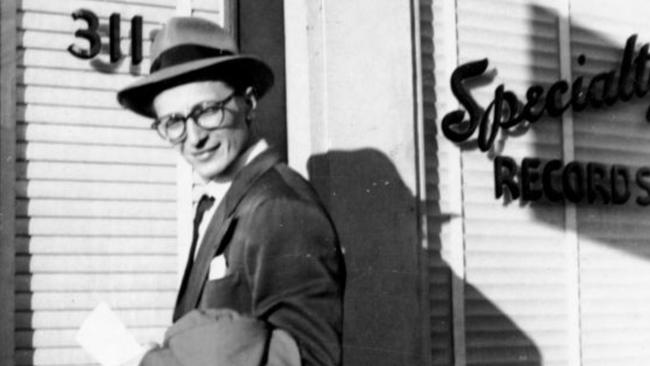Art Rupe brought black American music to the centre of pop culture
Art Rupe studied black bands and singers to discover what made their records so exciting – he then found Little Richard and Sam Cooke.

The two men who created rock ’n’ roll had this in common: they shifted gospel from church to the charts.
Sun Studios owner Sam Phillips famously said: “If I could find a white boy who could sing like a black man I’d make a million dollars.” Soon after, 19-year-old Elvis Presley walked in off the street.
Presley’s gospel foundations are sometimes overlooked, but it was always his music and his roots from East Tupelo’s First Assembly of God church. His three Grammys were for gospel recordings.
The lesser known Art Rupe understood that if he could put the essence of gospel into popular songs he’d have a potently marketable mix. He used to buy so-called race records – the music of black America recorded for and sold to that audience – trying to decipher the code that made them so exciting. He had been exposed to gospel as a boy in a working-class Pittsburgh suburb while attending a Baptist church.
Born Arthur Goldberg, when he was in his early 20s he discovered that his father and grandfather, Ukrainian Jews, had adopted the name Goldberg when they arrived in the US. At 22 he reverted to the ancestral surname.
He did well at school and moved west to take on business studies at the University of California Los Angeles. But World War II intervened and he ended up working repairing Liberty ships, 2710 of which were built quickly in the US to replace torpedoed British cargo shipping – transporting oil, armaments and food. After Pearl Harbor they moved American troops to Europe.
As the war closed, Rupe wanted to work in films but turned instead to music. During the war the supply of shellac from which gramophone records were made was controlled by the government, so that the resin laboriously collected from Asian lac bugs could be used to make signal flares for the Liberty fleets.
Rupe reckoned demand for popular music would quickly gain pace – records made of shellac would be in demand, and he knew how to source it. With victory over Germany and Japan in sight, he invested in a small company that recorded the emerging artists Nat King Cole and Frankie Laine.
It didn’t work out and soon after he formed Specialty Records. By then he had familiarised himself with what he believed made a hit. It was 1946; rock ’n’ roll was not far off.
In 1951, at the then new Sun Studios in Memphis, Ike Turner taped Rocket 88 – widely considered the first rock record – and it was game on.
Rupe recorded gospel-trained Lloyd Price’s Lawdy Miss Clawdy, a big hit in 1952 (but Price is better remembered in Australia for the later hit Personality). Price directed his mate – an unusual, short, cross-dressing piano player and high-pitched gospel shouter known by the family nickname Little Richard – Richard Penniman – to Rupe.
Richard, despite his strict religious upbringing, included in his act the sometimes crude slang of black urban Americans. One particularly course song was Tutti Frutti. Its lyrics, cleaned up by a more experienced songwriter, took off and – “A-wop-bop-a-loo-bop-a-lop-bam-boom!” – the emerging rock format changed direction.
It has been argued that Tutti Frutti, with its nonsensical lyrics, furious boogie piano and frenetic marriage of blues, cast the die for all that followed. The singer then delivered Long Tall Sally, a song he taught a young Paul McCartney to sing when the Beatles supported Richard’s British tour. The Beatles famously covered it and, on the B side of their international hit Help, paid tribute to Richard with the McCartney belter I’m Down sung in the manner Richard had taught him.
Mississippi-born Sam Cooke was doing well in his gospel outfit, the Soul Stirrers, a Specialty Records act, but wanted to transition to the lucrative secular market. Rupe was concerned that without their star the Soul Stirrers would fail and the others would go broke. Rupe said Cooke could record four songs under a different name. “Dale Cooke” came up with You Send Me in the first sessions. It would top Billboard. By then Cooke had left Rupe, dropped Dale, and in quick succession wrote Wonderful World (with Herb Alpert), Chain Gang, Cupid, Twistin’ the Night Away, Another Saturday Night and – his answer to Blowin’ in the Wind – the civil rights anthem A Change is Gonna Come. He was shot dead by motel manager Bertha Franklin days before it charted.
Via Rupe, Cooke gave birth to soul music, beating a path later trod by Aretha Franklin, Al Green, Marvin Gaye, Stevie Wonder and the Womacks.
By then black music was mainstream. Placed there by Rupe.




To join the conversation, please log in. Don't have an account? Register
Join the conversation, you are commenting as Logout